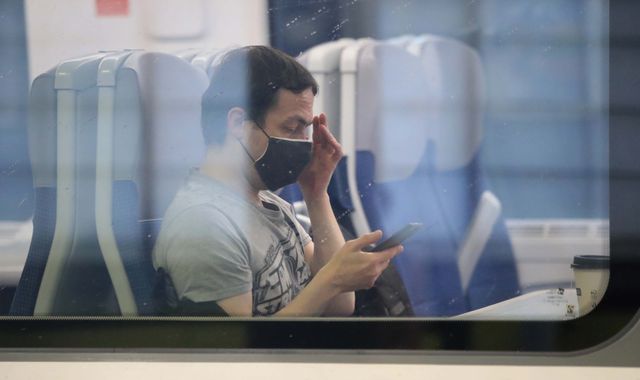Coronavirus cases could reach 49,000 a day within weeks unless infection rates slow, chief scientific adviser warns
Written by News on 21/09/2020
The UK could soon see 49,000 new cases of coronavirus every day unless action is taken to drive down the current rate of infection, the government’s chief scientific adviser has warned.

Sir Patrick Vallance told a Downing Street briefing that the number of new COVID-19 cases was doubling roughly every seven days.
Live coverage of the latest coronavirus news and updates
The briefing came as Prime Minister Boris Johnson considers tightening measures to stop the spread of the virus.
Sir Patrick said that, if the current growth in cases continues unabated, the UK will be seeing about 50,000 coronavirus cases a day by the middle of October.
This would translate to “200-plus deaths a day” by mid-November.
“The challenge therefore is to make sure the doubling time does not stay at seven days,” he said.
“There are already things in place which are expected to slow that, and to make sure that we do not enter this exponential growth and end up with the problems that you would predict as a result of that.
“That requires speed, it requires action.”
Sir Patrick, who appeared alongside England’s chief medical officer Professor Chris Whitty, said there had been an increase in cases in every age group – and dismissed the suggestion that the uptick was down to more tests being carried out.
He told the briefing that about 8% of the population, approximately three million people, may have been infected with the virus and therefore have antibodies.
“It means the vast majority of us are not protected in any way and are susceptible to this disease,” Sir Patrick added.
Prof Whitty said there were now “significant rates of transmission” in parts of the UK.
“What we’ve found is, as we go through in time, anywhere that was falling is now moving over to beginning to rise and then the rate of rise continues in an upwards direction,” he told the briefing.
“So, this is not someone else’s problem, this is all of our problem.”
And he suggested that restrictions on people’s social lives may need to be introduced – telling the briefing that trying to “break unnecessary links between households” was important because “that is the way in which this virus is transmitted”.
“We all know we cannot do this without some significant downsides,” Prof Whitty continued.
“This is a balance of risk between if we don’t do enough the virus will take off – and at the moment that is the path we’re clearly on – and if we do not change course we are going to find ourselves in a very difficult problem.”
Prof Whitty told people to expect a tough winter.
“At this point the seasons are against us, we’re now going into the seasons – late autumn and winter – which benefit respiratory viruses, and it is very likely they will benefit COVID, as they do, for example, flu,” he said.
“So we should see this as a six-month problem that we have to deal with collectively, it’s not indefinite.”
Sir Patrick said there was “good progress being made” on a coronavirus vaccine, adding: “We don’t yet know they will work but there is increasing evidence that is pointing in the right direction and it is possible that some vaccine could be available before the end of the year in small amounts for certain groups.
“Much more likely that we’ll see vaccines becoming available over the first half of next year, again not certain but pointed in the right direction, which then of course gives the possibility of a different approach to this virus.”
Labour’s shadow health secretary Jonathan Ashworth said the pair had “presented a grim picture” of the current situation.
“This rapid spike in infections was not inevitable, but a consequence of the government’s incompetence and failure to put in place an adequate testing system,” he said.
“The prime minister is making a statement later this week, but Labour’s priority is that there must be a national effort to prevent another national lockdown.
“The government must do what it takes to prevent another lockdown, which would cause unimaginable damage to our economy and people’s wellbeing.”
:: Subscribe to Sophy Ridge on Sunday on Apple podcasts, Google podcasts, Spotify, Spreaker
Daily confirmed cases have returned to levels last seen in May.
And the R number, which shows the spread of the virus, is now between 1.1 and 1.4.
A further 4,368 new coronavirus cases have been confirmed in the UK on Monday, compared with 3,899 reported on Sunday.
The government said a further 11 people have died within 28 days of testing positive for COVID-19 as of Monday, bringing the UK total to 41,788.
Professor Whitty has warned that infection rates are “heading in the wrong direction” – and the country is at a “critical point” in the pandemic.
About 13.5 million people across the UK are currently facing some form of local restrictions.
The PM has said he does not want to put the country into a second national lockdown – but it is understood that Downing Street is looking at introducing temporary nationwide restrictions to try and “short-circuit” the virus.
However, government figures have stressed the plans being drawn up stop short of the full national lockdown that was introduced back in March.
Proposals being worked up could see essential travel to schools and workplaces continuing, but restaurants and bars shut – or perhaps operating on restricted hours – with different households told not to mix at all.
Analysis: Whitty and Vallance deliver hard truths to prepare the ground for the PM
By Beth Rigby, political editor
It’s clear from what they are saying that they are preparing the ground for the prime minister to make some kind of announcement about what action he’s going to take to try and stem the rise in cases.
It was the idea of hard truths, preparing the ground for what is to come, and it was trying to take the politics out of it – to give the public the hard facts, set out by advisers that crunch this data all the time.
The key message was the slide by Sir Patrick Vallance when he talked about the epidemic doubling every seven days.
He was pretty clear: if it continues unabated, by mid-October you end up with 50,000 cases a day.
He went on to say there’s potential for this virus to move very fast and to stop that we’ll need “speed and action”.
It was pretty clear what zone the government is trying to get the country into, in terms of what the prime minister might announce this week.
(c) Sky News 2020: Coronavirus cases could reach 49,000 a day within weeks unless infection rates slow, chief scientific adviser warns






